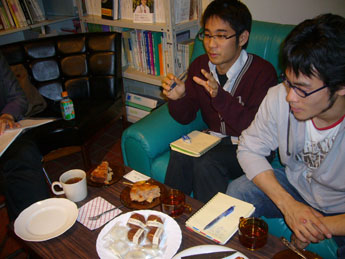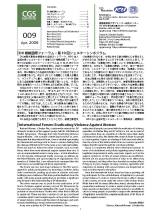Shintaro ISHIGURO
Chair, ICU Festival Committee 2008
Keita UEHARA
Committee Planner, ICU Festival Committee 2008
Naoko TAKAYAMA
Counselor, Support House Jomu
Makiko ISERI, Takako NIWA and Naomi SUZUKI
CGS staff members
【The article below is the same as the article that appears in the 11th issue of the CGS Newsletter. The full Japanese version of this discussion can be viewed on here.】

Last year, the ICU Festival 2008 committee had several meetings with CGS staff to discuss whether or not a beauty contest should be held at the ICU festival. Today, Mr. Ishiguro (SI) and Mr. Uehara (KU) of the festival committee met with CGS staff members (Iseri (MI), Niwa (TN) and Suzuki (NS)) for a round-table discussion facilitated by Ms. Takayama (NT) a professional counselor. We hope this article will clarify the issues involved and help you form your own opinions.
 The ninth issue of the CGS Newsletter is now available both in print and online. Click the URL to download the PDF version.
The ninth issue of the CGS Newsletter is now available both in print and online. Click the URL to download the PDF version.  The seventh issue of the CGS Newsletter is now available both in print and online. Click the URL to download the PDF version. All the articles that appear in this issue are summaries of the full texts,
The seventh issue of the CGS Newsletter is now available both in print and online. Click the URL to download the PDF version. All the articles that appear in this issue are summaries of the full texts,